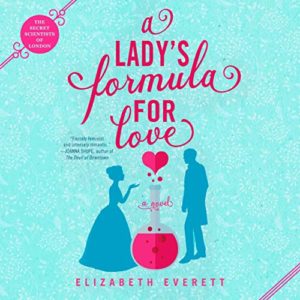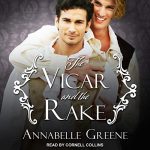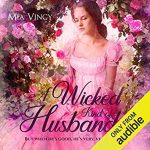Narrated by Elizabeth Jasicki
I’ve always loved historical romance, and although I’m finding it increasingly difficult to find historicals to enjoy (so much HR right now features twenty-first century people in costume) I still look out for new authors to try. Elizabeth Everett’s début romance, A Lady’s Formula for Love, was getting quite a bit of advance buzz, narrator Elizabeth Jasicki is experienced in the genre – although I don’t think I’ve listened to her before – so I decided to give this one a go, and… I really wish I could tell you it was great. But I can’t.
The widowed Violet Hughes, Lady Greycliff, is a brilliant chemist and the founder of Athena’s Retreat, ostensibly a social club for ladies, but really a place for them to indulge their passion for science and to undertake research, somewhere they can use their brains and display their intelligence freely without having their ideas belittled by men. But word has leaked out about the true purpose of the club, and Violet has received threats against her and the club that her stepson William, Viscount Greycliff (who is a government agent) suspects originate from a radical, anti-government group. Grey has to be away from London for a few weeks, so he engages Arthur Kneland, a former colleague and experienced protection officer, to act as bodyguard for Violet while he’s away.
At the beginning of the book, Violet has stepped outside the club to speak to a crowd of journalists (I had no idea why they were there) when Arthur – who is walking outside with Grey – somehow intuits that a bomb is about to explode (I had no idea how he did this – maybe he was a sniffer-dog in a past life?) and rushes to throw himself atop his new charge. This happens at the end of chapter one; by the beginning of chapter two, the insta-lust has started.
While preparing to put on the club’s first public event – An Evening of Edification and Entertainment – Violet is also working on a sooper-sekrit government project (given her by Grey) to create an antidote to a harmful chemical being employed by the aforementioned anarchists. Well, I say secret… it’s supposed to be a secret, but Violet had to ask some of the other ladies some obviously fake-science-y questions, so now they all know, too:
“…I had a question about sulfuric acid and potassium hydroxide, so I consulted Phoebe.”
“Then there was the particularly complex equation when I took into account Dalton’s law, and who better than Letty . . .”
(It would seem Violet’s “brilliance” extends no further than GCSE Chemistry. And in England, it’s “Sulphuric”.)
In A Lady’s Formula for Love, we have a romance between a couple who are a little older than the norm for the genre – he’s forty, she’s thirty – with some feminist themes nicely woven throughout. I appreciated that the message contained within – about the lack of options open to women, especially those of a certain status, their utter dependence on menfolk who could mistreat them without consequence, and the prevailing view that a woman’s opinions and thoughts were worthless – was conveyed subtly and in a way that was very much in keeping with the story and not at all heavy-handed. But I couldn’t get behind the romance; Violet and Arthur are lusting after each other from almost the first page and we get lots of sex scenes and internal monologue as substitutes for relationship and character development. The principals are fairly bland, and I really didn’t care for the way Violet was stereotyped as an absent-minded, mad-scientist type. We’re told she’s brilliant – several times – yet she forgets to eat and sleep… it’s so old hat. More interesting is the way she’s rebuilding her confidence and self-esteem after her late husband almost destroyed them through constant criticism, and how his insistence that a woman who enjoys sex is unattractive continue to plague her – although she seems to gets past that fairly quickly once she starts lusting after Arthur ;)
And speaking of Arthur. He’s stoic and a bit starchy and of course, haunted by a past failure. Twenty years earlier, on his first job, one of his protectees was shot. (Admittedly, the bullet when through Arthur, but still…) Of course he’s attracted to Violet, but as every good bodyguard should, he sets aside that attraction and keeps his hands (and other appendages) to himself so that he can focus on doing his job.
NOT.
Eh, of course he doesn’t. What he DOES do, is remind himself – often – that he can’t let his attraction to Violet distract him from his job – and then promptly does the opposite.
The pacing is uneven and the book suffers from the outset from there being just… too much, too soon of everything. Right from the start, we’re overloaded with secondary characters, stuff going on in the background that might or might not be relevant and insta-lust, and I was quite a few chapters in before I’d worked out what was actually going on. All this activity led to a diluting of the romance, and the lack of focus on the connection between Violet and Arthur led to a seriously underdeveloped relationship that went from a few conversations to … I was going to say the mattress mambo, but now I come to think of it, poor Violet is shagged on desks and tables the first few times and they don’t make it to an actual bed until much later! They were decent and likeable enough characters, but when it comes down to it, I couldn’t work out why they were interested in each other, or feel any real emotional connection between them.
Elizabeth Jasicki is a very experienced narrator, and some aspects of her performance are very good. She differentiates effectively between all the female characters (and there are quite a few), although I did have to rely on dialogue tags quite often to work out who was who. That said, I suspect that’s more to do with the fact that there are so many secondary characters who pop in and out, there just wasn’t the time to get used to them so I could identify them aurally the next time they appeared. The exceptions to that are, of course, Violet, and Lady Phoebe, to whom Ms. Jasicki assigns a distinctive, nasal drawl. (Oh, and the housekeeper Mrs. Sweet, who is from the West Indies – and the less said about her accent, the better.) Ms. Jasicki portrays the male characters without too much of a drop in pitch, but they’re okay – I liked her interpretation of Grey best of all. But, oh dear, her portrayal of Arthur was horrible and made an already underdeveloped romance into a complete non-starter. He’s a Scot and the accent Ms. Jasicki employs is … not good. It’s okay when he’s only got to say two or three words, but she had trouble sustaining it for longer than that and it would wander off somewhere, often as far south as Yorkshire, before she attempted to re-direct it back to more northern climes. I cringed every time he spoke, and in the love scenes… well, I fast-forwarded through some of them, because whenever he said something romantic or sexy, I just wanted to laugh. And then cringe some more.
A hero who sounds ridiculous is the death knell in a romance audiobook, but it isn’t the only reason I can’t recommend this one. The romance is underdeveloped, the plot is a mess and the big reveal is… I can’t say much without spoilers, but the ending is unsatisfying. The villain doesn’t get the comeuppance one might have expected or wanted, and although this person’s situation certainly evokes sympathy, it still doesn’t excuse their plan to maim and murder.
I could say more about my dissatisfaction with both story and narration in A Lady’s Formula for Love, but I think I’ve said enough to explain why I’m not recommending it. I spent ten hours, thirty-four minutes listening to it so you don’t have to.
Caz
Buy A Lady's Formula for Love by Elizabeth Everett on Amazon





Well, as accents are an issue, this is definitely one that I’d better avoid!
Sadly, I find that “it’s so old hat” can be said about so many m/f HRs that I find myself too bored to even investigate most of them.
That’s the issue I’m having with most HR, too. Of course romance is full of tropes, and the best authors can perk them up a bit, but these days, I mostly look at an HR synopsis and just can’t find any enthusiasm whatsoever. And that’s sad because I used to love it and read it almost exclusively. Tastes change of course, and there’s still good HR out there, it’s just very few and far between. I’ve read one superb one (King’s Man by Sally Malcolm) and one pretty good one (To Love and to Loathe by Martha Waters) recently and there are some Mills & Boon/Harlequin Historical authors I’ll always look out for, but it’s been slim pickings the past few years if you don’t want to read about nineteenth century crime-fighting ninja heroines, or heroines who run gaming houses/shipping companies/orphanages etc. and the ubiquitous ducal heroes, and sadly that doesn’t look like it’s going to change anytime soon.
It never ceases to amaze me when production companies pick a narrator who can’t convincingly sustain a required accent. If it was a bit part, okay, but not one of the leads. Incidentally, I’m currently proofing an audiobook which has exactly the same issue – a Scottish hero and a narrator whose Scottish accent is … not good. Who the hell makes these choices?!
Are different people becoming narrators now? I think that they used to be trained actors, so a decent Scottish accent should be in their repertoire? Or just get a Scot to narrate a Scottish MC?
I didn’t read many m/f HRs last year and I only classed two of them as good – The Chase and ‘The Lord I Left’ by Scarlett Peckham. The other 5? were ‘okay’. Five m/m HRs made it onto my Best of 2020 list, however. I agree with you that some authors can make the tropes seem fresh and work……….. I never want to read about a heroine who longs to run a gaming house again!
I think most narrators are trained actors – but I suppose their abiliity to “do” accents isn’t necessarily any better than anyone else’s – I think if you have the aptitude, then you have it and just because you can act, doesn’t necessarily mean you’ll be able to adopt a variety of accents. I mean, I’m a musician, and while I can play several wind instruments, it doesn’t mean I could play the violin!
Is it terrible these days when I feel almost relieved not to add one to my TBR pile?:-) Thanks for being part of my book filtering system. and saving me 10+ hours.
Nah, that’s why I do what I do – saving the world time and money one audiobook at a time!